25 Best (And Worst) Online German Courses For 2023
 Written byStephanie Ford
Written byStephanie Ford- Read time24 mins
- Comments4

If you’re looking for the best online German course, you may have noticed that there are too many choices.
German is one of the most sought-after languages.
It’s spoken widely across Europe and is one of the major languages of the EU. There are over 95 million native German speakers in the world, and the language is the official language of 6 countries.
These include (among others) Germany, Belgium, Austria, Switzerland and Liechtenstein. Globally, there are over 210 million German speakers, which puts German as the 11th most spoken language in the world.
Because German is so popular, most people have heard some German at some point in their lives and are interested in learning the language for themselves.
There isn’t just a desire to travel to Germany and communicate (though this is probably the most popular reason) but it’s also a great language to learn for business, academia and more.
German - English translation is a lucrative and popular career path for many.
Also, German has a fascinating history which is made more interesting by learning the language.
Today I’m going to share with you the best and most popular online German courses (I’ve used all of them) and give you my own opinion as an German speaker.
For each listing below, I’ll cover key points, pricing, and the pros and cons.
There are also some below that I don’t personally recommend (even though they may be popular with other people).
Table Of Contents
- Rocket German
- GermanPod101
- German Uncovered
- SmarterGerman
- Pimsleur German
- Glossika German
- Mondly German
- Babbel
- Mango Languages German
- italki
- Udemy
- Rosetta Stone German
- Mimic Method German
- Berlitz
- Busuu
- Lingoda
- Deutsch Online
- Decks
- FluentU German
- Duolingo German
- Living Language
- Deutsch-Lernen
- Language Transfer
- Loescen
- Michel Thomas: German
DISCLAIMER: Some of the courses listed below aren’t technically “courses” for German. I’ve included them because they’re important enough for German learners to be listed in an article this detailed. There are also some affiliate links included in the list on some items, FYI.
The very best online German courses
These are (in my humble opinion) the best online German courses available today.
These resources have outstanding reputations, and I’ve found them personally to have the most ‘value for money’.
1. Rocket German

Cost: Starts from $99.95 (with the default discount code applied)
Summary: Rocket German has been around for well over a decade, is extremely popular with polyglots and it’s one of the top recommendations on The Mez Guild. Of all the German course options here, Rocket German suits the structured learner most as it’s designed to be followed in a linear progression (from beginner to advanced).
However, you’re not obligated to follow their path and you can do it your own way if you wish.
The audio lessons in Rocket German are delivered in both a podcast-style format that’s very easy to follow, and audio dialogues that give you the German dialogue you need and nothing more.
Rocket German’s course covers all language skills very well (listening, speaking, reading and writing), and their inbuilt voice recognition is one of the most accurate available (it uses Google’s Web Speech technology).
For structured learner types, it’s my preferred German course.
Read this detailed review of Rocket German.
What I like:
- The most comprehensive German course of its kind currently available.
- For learners wanting structured course learning (still optional), Rocket German has a very clear linear progression.
- Course covers all 4 major skills evenly (listening, speaking, reading, writing).
- Students are motivated to continue by the inbuilt leaderboard.
What I don’t like:
- Would be even greater if Rocket German added a video element to its audio course content.
Join The Guild by clicking here, select German and I’ll send you a unique offer for Rocket German exclusive to my readers only.
2. GermanPod101

Cost: Starts as low as $4 a month
Summary: GermanPod101 is a very popular website with loads of useful German course content. While GermanPod101 claims to provide its teachers with a basic roadmap as to what sorts of lessons to teach students, many students complain that the lessons feel messy and unstructured (it has improved though).
One of the last things someone new to a language wants is to utilize a program that is difficult to follow. Learning a new language is hard enough, and users want programs that simplify the process rather than complicate it.
The lessons are grouped thematically, which may appeal to some users. Those looking for a straightforward grammatical progression in their lessons would likely do better to look at a course like Rocket German (see above).
See this detailed GermanPod101 review.
What I like:
- Create your own intuitive path through the materials provided
- Loads of content to work with
What I don’t like:
- Choosing your own path as the student might not be the best way to truly learn a language
- Excessive marketing
UNIQUE OFFER: Use the code MEZZOGUILD to save 25% on any of their German course options.
3. German Uncovered

Cost: One-time purchase of $297
Summary: German Uncovered is a course more fluent German speakers will likely benefit from the most. Rather than provide modules or lessons, this course gives users long blocks of story-based texts to learn from.
If you’ve got a higher-level grasp of German and want to test your reading skills using some interesting material, you’ll definitely enjoy what Italian Uncovered has to offer you.
However, German Uncovered might be a stretch for brand new learners.
What I like:
- Unique, story-based course for learners of German.
- Comprehensive.
What I don’t like:
- May not appeal to learners who don’t enjoy literacy-based methods.
Read our German Uncovered review.
4. SmarterGerman

Cost: This German course bundle has a really unique “pay what you can afford” pricing ($99, $299 or $499). This means that you decide what to pay based on what you can afford.
This is paid as a one-time payment. Includes a 30-day money-back guarantee.
Summary: SmarterGerman is one of the most popular German courses currently available, and it provides courses for language levels A1-B1 in German (all included as part of the “Magnificent German bundle”).
These courses cover vocabulary, grammar, listening, and reading, and touch upon speaking and writing as well.
The course has been designed to make learning German simple and logical and was developed by a German-language expert with over 20 years of experience.
What I like:
- This is a premium program that was previously only available to private clients.
- Students can learn whenever they want to, at their own pace without the need to compete.
- A free trial is available.
- ‘Pay what you can afford’ option.
What I don’t like:
- Teachable platform
See this SmarterGerman review.
UNIQUE OFFER: Use the red button here to get 10% off any SmarterGerman course.
5. Pimsleur German
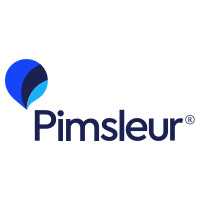
Cost:$14.95 a month subscription (or $119.95 per level)
Summary: Pimsleur’s a household name that’s been around for many decades and earned its reputation as one of the best courses for German. It’s 100% audio and the entire course involves spaced-repetition recall of phrases within specific cultural scenarios.
Pimsleur is a good entry point for German but it will only familiarize you with the basics. Treat Pimsleur German as a foundational course and then move on to something more broad.
Pimsleur does not offer any video or written content. It’s purely audio (a good thing).
Read my extensive and very detailed Pimsleur review for more info.
What I like:
- Timeless classic that was developed on solid SLA studies and has remained useful for decades.
- Pimsleur’s spaced repetition algorithm is extremely effective at training recall in German.
- Inexpensive.
- Gets you repeating and recalling phrases constantly.
What I don’t like:
- Since it’s decades old, certain expressions may seem dated and irrelevant.
- Does not equip you as well as it should for listening comprehension (too much English).
6. Glossika German
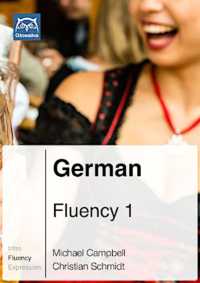
Cost: $30 a month
Summary: Glossika is one of the most unique language products available and, in my opinion, one of the very few that uses a natural, research-grounded method. In fact, the Glossika method aligns very closely with how I personally learn languages (including German) and I’ve seen tremendous success doing it.
The basic crux of the Glossika courses is high repetitive of lexical chunks – in other words, listening over and over to a sequence of sentences at natural speed and repeating them. It is hands down the most effective trainer for listening comprehension.
German grammar is absorbed naturally without tedious memorization of rules. Just lots of listening and repeating!
See my epic Glossika review and interview with its founder.
What I love:
- One of the closest German course products to my own personally-developed, proven learning style.
- No grammar memorization or unnatural language learning.
- Well-suited to German learners who prefer audio rather than visuals.
- Access to every other language and language pair with one single subscription.
What I’m not a fan of:
- Needs a better way to teach students how the approach works.
- Audio of some languages is of an inconsistent quality.
- Reported errors in scripts (I’ve yet to encounter any personally).
7. Mondly German

Cost: Starts at $9.99/month
Summary: Mondly takes a different approach than module-based learning systems. The entire interface feels more like an interactive game.
Using cutting edge technology, users can choose between Virtual Reality and Augmented Reality options in order to fully immerse themselves in a world learning German (I believe Mondly’s the first company to attempt this).
Users are encouraged to participate in daily lessons in order to accumulate the knowledge necessary for the weekly test. Because users who miss a day are not able to participate in the weekly assessment, Mondly capitalizes on the science behind practice that makes apps like this addictive for users.
What I like:
- Immersive and feels much different than other, typical language learning programs.
- First company to use VR for language learning.
What I don’t like:
- Some language options (other than German) aren’t that great.
Read this Mondly review.
8. Babbel
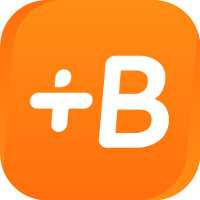
Cost: Bulk pricing is available when purchasing multiple months at once. Otherwise, the course is $12.95 for a single month
Summary: Babbel is a decent option because it provides German courses across various levels. There are courses for newbie German learners and it’s very similar in functionality to both Duolingo and Rosetta Stone.
See this Babbel review for more info.
What I like:
- Users can choose lesson content based on their interests, such as countries and traditions, or reading and writing. This gives the course a unique, customizable feel.
What I don’t like:
- Not much in terms of advanced level lessons available on this platform, so students with a high level of proficiency won’t find much new to learn here.
9. Mango Languages German
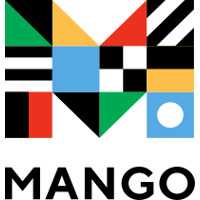
Cost: $7.99 a month
Summary: Mango Languages has implemented one of the most intuitive ‘chunking’ approaches in its course style for German (very close to The Mez Guild’s method). It does this by avoiding grammar explanations and instead highlighting lexical chunks in colors to help you learn language patterns.
The only problem with Mango is that it’s quite lightweight on its course depth. If they developed advanced courses for German, it would be a perfect solution.
Why I love it:
- Mango’s intuitive ‘chunking’ interface is the best implementation in any product we’ve seen
- Beautifully designed and a pleasure to use
- Inexpensive
What I don’t like about it:
- Lacks the German course depth I would expect to see in such a great platform making it mostly unsuitable for higher-level learners
10. italki (for German)

Cost: Varies widely. Can go as low as $4 an hour.
Summary: italki connects German learners with teachers and tutors. As with similar services, it doesn’t provide curriculum or content to instructors.
What italki has going for it is its extremely well-vetted instructors in German tuition. italki has a great reputation online as being the place to hire German tutors and conversation partners.
Teachers succeed on italki through client feedback, meaning low quality teachers simply will not cut it on the platform.
Read this massive italki review for more info.
What I like:
- Facilitates great connections with expert German teachers
What I don’t like:
- No set curriculum means you could be paired with an inexperienced new teacher not yet weeded out by italki’s review system
UNIQUE OFFER: If you sign up to italki using this link and take a lesson, you’ll get a bonus German lesson for free.
Other great German courses
I’ve already mentioned my personal favorites for learning German but there are plenty of other quality online course options for German.
Read on.
11. Udemy German courses
Cost: Pricing varies depending on the specific course selected.
Summary: Udemy is a very popular online course platform and currently serves over 300,000 German language students.
One of the best features of Udemy is that students can choose from a wide range of German language courses so they can find one that is tailored to their needs.
Udemy can help students find the right course as well after the student takes a short survey.
What I like:
- The courses provided feature expert-level instructors and every course includes a 30-day money-back guarantee.
What I don’t like:
- The downside of this option is that there is an overwhelming number of course options to choose from, which may not be ideal for students who are looking for a more convenient, ready-to-go option.
- Quality varies greatly.
12. Rosetta Stone German

Cost: Rosetta Stone costs $12 per month for a 3-month subscription and discount pricing is available for bulk purchasing, as low as $6.50 per month.
Summary: Rosetta Stone is one of the most recognized brand names in language learning and offers an immersive German language course that focuses on practical learning. With 25 years in the industry, Rosetta Stone now features an award-winning app that allows students to learn at their own pace.
Read this epic Rosetta Stone review for more info.
What I like:
- Lessons on the app are only 5-10 minutes long and include high-end digital features such as the ability to point the camera at an object in real life and receive a translation.
- The cost of both the app and the desktop software is included in the subscription price.
What I don’t like:
- The downside of this option (for some) is that there is no explicit grammar instruction whatsoever.
13. Mimic Method – German
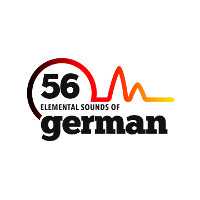
Cost: The Mimic Method costs $197 and provides users with lifelong access to their materials
Summary: The Mimic Method German course focuses on having students listen to German speakers and obtaining a feel for the language firsthand. It’s very much an audio course for German that tries to teach you to “mimic” what you’re hearing.
German pronunciation can be a challenge, and learners may not be familiar with all of them. The Mimic Method is a great opportunity to focus on pronunciation alone treating the language as if it were ‘music’.
The Mimic Method provides a supplementary Q&A video for lessons in an attempt to cover any further questions users may have regarding the material presented.
What I like:
- This method is very unique and gets away from ineffective, conventional study. Students learn German by speaking, similar to full immersion.
What I don’t like:
- Some people may find the unorthodox approach difficult to understand and follow.
14. Berlitz
Cost: Private/one-on-one online instruction costs around $2,500
Summary: Berlitz Virtual Classroom (BVC) is the best online German course for language learners who are looking for a premium educational experience, accompanied by one-on-one, real-time instruction (all online). Berlitz is widely regarded as a high-quality language learning service, and it’s online courses include the same content as their on-site courses.
What I like:
- Lesson scheduling is flexible and includes the use of virtual tools, recorded lessons, and aligns with student’s individual needs and goals.
What I don’t like:
- Extremely expensive
15. Busuu

Cost: This course is available for EUR5.95 per learner per month for the basic course, or EUR9.25 per learner for the intermediate level
Summary: Busuu is one of the best online German courses because it contains hundreds of German lessons across 80 units.
Busuu uses AI technology to help users refine their pronunciation and the course has been designed by experts in the German language.
What I like:
- The course includes conversation exercises in which users can find native German speakers in Busuu’s online communication and practice speaking German with them.
- Busuu is a great option for any level speaker and the lessons are simple and fun.
- It also offers a vocabulary trainer to help users retain their new vocabulary.
What I don’t like:
- The downside of this option is that some of the lessons are a bit outdated.
See this Busuu review.
16. Lingoda
Cost: Starts at EUR9 per month
Summary: Lingoda features live, online classes taught by certified teachers residing in Germany. All of Lingoda’s course materials are designed to meet the European Framework (CEFR). Students will learn the language across multiple formats, including speaking, listening, reading, and writing.
What I like:
- Classes are available 24-7 and students can choose between private lessons or small group classes with typically 3 students each.
- This course also instructs students on the use of “street talk” and the curriculum is highly customizable.
What I don’t like:
- Lessons must be scheduled in advance
See this Lingoda review.
17. Goethe Institut – Deutsch Online
Cost: This course is priced at EUR695 per level
Summary: The Goethe Institut is ideal for both beginners and advanced learners.
This program is highly customizable and features personalized support from a real instructor, which makes it the best online German course for students who want a lot of tutoring. All the materials in this course have been professionally developed.
This is the perfect program for independent learners who want some personalized coaching along the way.
What I like:
- There is a free trial available for this course, which has programs for language levels from A1 to B2.
- The lessons cover pronunciation, grammar, and writing.
What I don’t like:
- Very expensive
18. Memrise

Cost: Free
Summary: Memrise moved its free “community” courses to a site called Decks, but continues to run a premium subscription on the original Memrise site.
Decks appears to be identical to what Memrise use to offer.
These are 100% free community-added German courses in the form of a gamified flashcard deck. You go through a flashcard game of “watering plants” to study and progress. It’s highly addictive and actually quite effective.
Not all courses are good but some are fantastic. Look for ones that include audio and, in my opinion, teach phrases rather than words.
What I like:
- It’s an effective memorization tool for German phrases and words.
- The addictive nature of the game gets you coming back often to continue learning.
- It’s all free.
- There are loads of community-driven courses to choose from.
What I don’t like:
- As it’s community-driven, you can’t always guarantee quality.
German courses that are popular but not what I’d personally recommend
There are some online German courses that just aren’t that great (in my opinion).
These are well-known German course products that are liked by some people but I’m just not a big fan myself.
I’ve listed them here.
19. FluentU

Cost: FluentU costs $30 per month. Users can get 4 months free when signing up for a full year at $240
Summary: FluentU helps students learn German through the use of real-world video content. The concept behind this style of instruction is to provide an immersive online ‘course’ (kind of).
Students learn by watching scenes from German videos that pertain to real-life German culture and it features German and English interactive subtitling.
See this review of FluentU too.
What I like:
- This is a great option for learners who don’t enjoy a lot of reading.
- There is a two-week free trial available.
What I don’t like:
- The downside is that it does not offer any live instruction and the learning environment is very non-traditional (even compared to a typical online course) which may not be ideal for all learners.
20. Duolingo German
Cost: Free
Summary: Duolingo is currently one of the most popular online German courses around. The Duolingo brand is widely known and respected, as it provides fun, effective lessons in a game-like setting.
It’s free to use but concerns have been raised over its sale of user translations in the past.
See this post on Duolingo vs Rosetta Stone.
What I like:
- Fun and addictive to use.
- Doesn’t cost anything.
What I don’t like:
- Easy to procrastinate using the tool for large amounts of time with little actual, real-world progress in German.
21. Living Language
Cost: $39 per month or $150 per year.
Summary: Living Languages offers an in-depth language learning course that is suitable for both beginners and advanced learners. The course is very interactive, incorporating flashcards and gamified learning modules. It also features audio learning and focuses on the areas of grammar and culture.
See this Living Language review.
What I like:
- The lessons are very detailed and cover a broad range of instruction methods.
- All audio is recorded by native German speakers to help students refine their pronunciation.
What I don’t like:
- One downside to this option is that it does not include a live tutor.
- Overpriced.
22. Deutsch-Lernen
Cost: Free
Summary: This course is simple and is intended for independent learners. It includes 10 Beginner lessons that provide a basic overview of German grammar, including verb forms and syntax, and 24 Advanced lessons.
What I like:
- All lessons are interactive and can be run in easy, medium, or difficult mode.
- A print version is also available for offline work.
What I don’t like:
- Outdated and difficult-to-navigate website.
23. Language Transfer: German
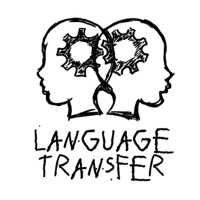
Cost: Free
Summary: I really respect the work that Language Transfer has done for German, putting together courses that have depth at no cost to the listener.
But my opinion of Language Transfer is very much the same as that of Michel Thomas (see below) as it appears to be a close knock-off of the same method. Teacher-controlled, excessive use of English, “don’t try to memorize”, poor pronunciation examples, no natural opportunities to listen or converse. At least it’s free.
It’s a great free resource to help get your head around tricky concepts but as a German language course, I don’t see a lot to gain from Language Transfer.
What I like:
- Language Transfer is a free initiative that seems to offer a lot (in German and other languages) at no cost
- It does a fairly good job at explaining difficult grammatical concepts for new beginners in German
What I don’t like:
- It’s basically a Michel Thomas course knock-off which I’ve never been a fan of (see below)
- Too much English
- Explicit grammar explanations are an unnatural way to learn a language
24. Loecsen
Cost: This course is available for free.
Summary: Loecsen is a self-paced online German course delivered 100% online that allows students to learn through basic repetition. This web-based program provides lessons across 17 major themes, including colors, family, and feelings.
What I like:
- On the plus side, it does offer a printable vocabulary list and there is no need to register or sign up for the course, as it’s all published publicly online.
What I don’t like:
- The major downside to this online German course is that it doesn’t provide any content for advanced learners and the website is poorly designed, featuring a weak user experience overall.
25. Michel Thomas German

Cost: Starts from $11.99
Summary: The basic premise of Michel Thomas German is that you relax like a client in a psychologist’s chair, and let the teacher control your learning. You’re told “never to try to learn”, no memorization, no outside practice, no student responsibility.
Michel Thomas teachers guide students through correcting their every mistake on the spot.
There’s no listening comprehension training and no natural conversation opportunities during sessions.
Overall, Michel Thomas might be a useful primer but I don’t recommend this course personally.
Read this detailed and highly controversial Michel Thomas review for more info.
What I liked:
- Michel Thomas does a good job of breaking down and explaining difficult concepts in German.
- To a certain extent, MT teaches students to learn ‘lexical chunks’ over explicit grammar rules.
- The German edition is touted as one of the best that Michel Thomas did.
What I didn’t like:
- Teacher-controlled learning has been proven by SLA researchers to be an ineffective strategy.
- Michel Thomas teaches zero listening comprehension and offers no opportunity for natural conversation practice.
- The course teaches you about German, but doesn’t teach you German.
- Way too much English, despite having a native speaker present who barely says a word.
- Celebrity endorsements and a total lack of research on Michel Thomas’ part are major red flags.
Summary: Best online German courses
This article covers almost every online German course option currently available.
At the end of the day, the number of online German courses available today is vast and each one has something different to offer. Before selecting a course, it’s important to consider what your unique needs are as a student and what your current level of knowledge is when it comes to the German language.
No matter which German course you go for, I highly recommend daily German practice with native speakers – ideally in person.
But if you have no opportunities to speak to native speakers near you, then italki is an incredible platform to find really affordable practice partners and tutors for German.
Overall, your success is determined by your own commitment.
Even if you had every course on this list, you could still fail at German without high motivation and consistency.
Likewise, even a mediocre German course can be powerful in the hands of someone with the right attitude and learning style.
If you’re looking for tips on how to learn German and overcoming various language learning struggles, make sure to subscribe below by ‘Joining the Guild’.
Good luck!
Know of an online German course that I didn’t mention?
Share it below in the comment section.
 Grab the link to this article
Grab the link to this article